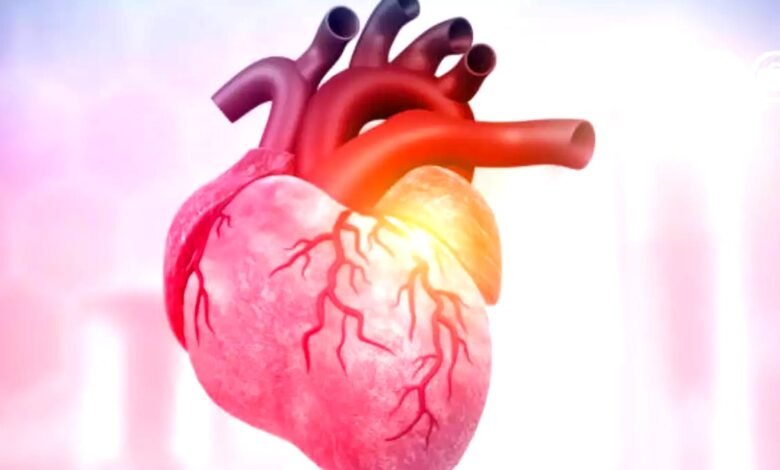Heart Matters: Navigating the World of Cardiac Health

In the intricate tapestry of well-being, few facets are as vital as the health of our hearts. “Cardiac health” is not merely a medical term; it encapsulates the essence of our overall vitality and longevity. In this comprehensive guide, “Heart Matters,” we embark on a journey through the labyrinth of cardiac health, exploring the nuances of prevention, lifestyle choices, and holistic care that contribute to a resilient and thriving heart. As the focal point of our circulatory system, the heart merits dedicated attention, and this guide is designed to provide insights, tips, and expert advice to help you navigate the complexities of maintaining a strong and healthy heart.
Navigating the world of cardiac health requires a nuanced understanding of factors that influence heart well-being. From the significance of a heart-friendly diet to the role of regular exercise and the early recognition of signs indicating potential issues, we delve into the multifaceted aspects of cardiovascular wellness. As we unravel the intricacies of “Heart Matters,” our aim is to empower you with knowledge that fosters informed decisions and cultivates a lifestyle that not only prioritizes your heart’s health but contributes to your overall well-being.
Read More: A Heart Attack Or A Panic Attack, Which Is It?
What is Cardiac Health?
Cardiac health refers to the well-being of the heart and the circulatory system. It encompasses the proper functioning of the heart, blood vessels, and associated structures. Maintaining good cardiac health is essential for optimal overall health and longevity.
Why is Cardiac Health Important?
The heart is responsible for pumping oxygenated blood to all parts of the body, supplying nutrients, and removing waste products. By maintaining good cardiac health, we reduce the risk of developing various heart conditions, ensuring the proper functioning of our body systems.
Common Cardiac Conditions
Coronary Artery Disease
Coronary artery disease occurs when the arteries that supply blood to the heart become narrow or blocked due to the buildup of plaque. It can lead to chest pain, heart attacks, and other complications.
Heart Failure
Heart failure refers to the heart’s inability to pump blood efficiently, resulting in fatigue, shortness of breath, and fluid retention. It can be caused by various underlying conditions, such as coronary artery disease and high blood pressure.
Arrhythmias
Arrhythmias are irregular heart rhythms that can manifest as palpitations, dizziness, or fainting. They occur due to abnormalities in the heart’s electrical system and can range from harmless to life-threatening.
Valvular Heart Disease
Valvular heart disease occurs when one or more heart valves become damaged or diseased, affecting the blood flow through the heart. It can lead to symptoms like fatigue, chest pain, and shortness of breath.
Risk Factors for Cardiac Conditions
High Blood Pressure
High blood pressure, or hypertension, puts extra strain on the heart and blood vessels, increasing the risk of heart disease and stroke. Lifestyle modifications and medications can help control blood pressure.
High Cholesterol
Elevated levels of cholesterol in the blood can contribute to the development of plaque in the arteries, leading to coronary artery disease. A healthy diet, exercise, and medications can help manage cholesterol levels.
Diabetes
Diabetes is a metabolic disorder that affects how the body processes glucose. It significantly increases the risk of developing heart disease. Proper diabetes management is crucial for maintaining cardiac health.
Obesity
Being overweight or obese puts strain on the heart increases blood pressure, and raises the risk of heart disease. Adopting a healthy lifestyle that includes regular physical activity and a balanced diet is important for weight management.
Smoking
Smoking damages the blood vessels, reduces oxygen supply, and contributes to the development of plaque in the arteries. Quitting smoking is one of the most significant steps toward improving cardiac health.
Preventive Measures for a Healthy Heart

Regular Exercise
Engaging in regular physical activity strengthens the heart and improves cardiovascular fitness. Aim for at least 150 minutes of moderate-intensity exercise or 75 minutes of vigorous exercise per week.
Balanced Diet
A heart-healthy diet includes plenty of fruits, vegetables, whole grains, lean proteins, and healthy fats. Limit the intake of processed foods, saturated fats, trans fats, and added sugars.
Stress Management
Chronic stress can have a negative impact on heart health. Engage in stress-reducing activities such as meditation, deep breathing exercises, yoga, or hobbies that bring joy and relaxation.
Regular Health Check-ups
Regular check-ups with a healthcare professional help monitor blood pressure, cholesterol levels, and overall cardiac health. Detecting any issues early allows for timely interventions and the prevention of complications.
Avoidance of Harmful Substances
Limit the consumption of alcohol and avoid recreational drug use. Excessive alcohol consumption can increase blood pressure and contribute to heart disease.
Diagnostic Tests for Cardiac Health
Electrocardiogram (ECG/EKG)
An ECG measures the electrical activity of the heart and can detect abnormalities in heart rhythm or structure. It is a non-invasive and painless test.
Echocardiogram
An echocardiogram uses ultrasound waves to create images of the heart’s structure and function. It helps evaluate the heart’s pumping efficiency, valves, and overall cardiac health.
Stress Test
A stress test assesses how the heart performs under physical stress. It typically involves exercising on a treadmill or stationary bike while monitoring the heart’s response.
Cardiac Catheterization
Cardiac catheterization involves inserting a thin tube into a blood vessel and guiding it to the heart. It helps diagnose blockages, measure blood flow, and assess the heart’s overall condition.
Blood Tests
Blood tests can measure cholesterol levels, blood sugar levels, and indicators of inflammation. They provide valuable information about cardiac health and overall well-being.
Treatment Options for Cardiac Conditions
Medications
Medications for cardiac conditions aim to control blood pressure, manage cholesterol levels, regulate heart rhythm, and improve heart function. They may include beta-blockers, statins, antiplatelet drugs, and more.
Lifestyle Changes
Lifestyle modifications play a significant role in managing and preventing cardiac conditions. These changes include adopting a heart-healthy diet, engaging in regular exercise, quitting smoking, and managing stress.
Surgical Interventions
In some cases, surgical interventions may be necessary to treat cardiac conditions. These can include procedures like coronary artery bypass grafting (CABG), valve repair or replacement, or implantation of a pacemaker.
Cardiac Rehabilitation
Cardiac rehabilitation programs combine exercise, education, and support to help individuals recover from cardiac events and improve overall cardiovascular health.
Lifestyle Choices for a Healthy Heart
Exercise and Physical Activity
Regular exercise, including aerobic activities and strength training, helps strengthen the heart and improve overall cardiovascular fitness. Find activities you enjoy and aim for consistency.
Healthy Eating Habits
A balanced diet rich in fruits, vegetables, whole grains, lean proteins, and healthy fats provides essential nutrients for a healthy heart. Avoid excessive intake of sodium, saturated fats, and added sugars.
Adequate Sleep
Adequate sleep is crucial for overall health, including cardiac health. Aim for 7-8 hours of quality sleep each night to promote heart health and reduce the risk of cardiovascular conditions.
Stress Reduction Techniques
Engage in stress-reduction techniques such as meditation, deep breathing exercises, or engaging in hobbies and activities that bring joy and relaxation. Find healthy ways to manage stress.
Limiting Alcohol Consumption
Excessive alcohol consumption can lead to high blood pressure and heart damage. Limit alcohol intake to moderate levels: up to one drink per day for women and up to two drinks per day for men.
Quitting Smoking

Smoking is a significant risk factor for heart disease. Quitting smoking improves cardiac health and reduces the risk of heart attacks and other cardiovascular conditions.
Cardiac Health and Aging
Age-related Changes in the Heart
As we age, the heart undergoes natural changes, such as a decrease in the heart’s pumping ability and changes in blood vessels. These changes highlight the importance of proactive heart health management.
Maintaining Heart Health in Older Adults
Older adults can maintain heart health by adopting a healthy lifestyle, managing chronic conditions, taking prescribed medications, staying physically active, and maintaining a strong support system.
Recognizing Cardiac Emergencies
Heart Attack
A heart attack occurs when blood flow to a part of the heart muscle is blocked, leading to tissue damage. Recognizing symptoms like chest pain, shortness of breath, and arm pain is crucial for seeking immediate medical help.
Cardiac Arrest
Cardiac arrest is a sudden loss of heart function, causing a person to collapse and lose consciousness. Immediate CPR (cardiopulmonary resuscitation) and the use of an automated external defibrillator (AED) are vital in this emergency situation.
Stroke
A stroke occurs when blood flow to the brain is disrupted, leading to brain cell damage. Symptoms include sudden numbness, confusion, trouble speaking, severe headaches, and loss of balance. Prompt medical attention is crucial.
Seeking Professional Help
Consulting a Cardiologist
If you have concerns about your heart health or have risk factors for cardiac conditions, it is advisable to consult a cardiologist. They specialize in diagnosing and treating heart diseases and can provide personalized guidance.
Importance of Regular Check-ups
Regular check-ups with a healthcare professional help monitor blood pressure, cholesterol levels, and overall cardiac health. They allow for early detection of any issues and the implementation of preventive measures.
Read More: 11 Warning Signs of Heart Disease in 2023
Conclusion
Taking care of our cardiac health is essential for a long and fulfilling life. By understanding common cardiac conditions, risk factors, preventive measures, diagnostic tests, and treatment options, we can make informed decisions to promote heart health. Adopting a heart-healthy lifestyle and seeking professional help when needed are key steps toward maintaining a strong and resilient heart.
FAQs
What are the warning signs of a heart attack?
Common warning signs include chest pain or discomfort, shortness of breath, pain or discomfort in the arms, back, neck, jaw, or stomach, cold sweat, nausea, and lightheadedness.
Can heart disease be reversed through lifestyle changes?
While lifestyle changes cannot reverse severe heart disease, they can significantly improve heart health, reduce symptoms, and lower the risk of future cardiac events.
How often should I get my heart checked?
The frequency of heart check-ups depends on various factors, including age, family history, and existing risk factors. It is best to consult a healthcare professional for personalized recommendations.
Are there any natural remedies for improving heart health?
While certain lifestyle choices like a healthy diet, regular exercise, stress management, and adequate sleep can positively impact heart health, it is important to consult healthcare professionals for evidence-based recommendations.
Is it safe to exercise if I have a heart condition?
In most cases, exercise is beneficial for individuals with heart conditions. However, it is crucial to consult with a healthcare professional or cardiac rehabilitation specialist to develop a safe and tailored exercise plan.







